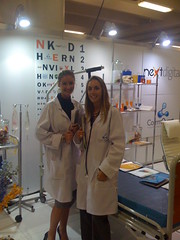 You know what it is like. There are faces everywhere. Banners. Stands. Noise. The bustle through the aisles urge you ever forward to where the scalding coffee waits your grasping, pre-keynote fingers. There are people you need to meet, folks you’d like to know better, and friends and colleagues waiting for you at the double doors. Someone, somewhere is in possession of a powerboard and will become your new best friend for the day. You are just three steps and a chance meeting away from your next big gig.
You know what it is like. There are faces everywhere. Banners. Stands. Noise. The bustle through the aisles urge you ever forward to where the scalding coffee waits your grasping, pre-keynote fingers. There are people you need to meet, folks you’d like to know better, and friends and colleagues waiting for you at the double doors. Someone, somewhere is in possession of a powerboard and will become your new best friend for the day. You are just three steps and a chance meeting away from your next big gig.
And then it starts.
The sessions fly past you at a rate of knots. There are networking drinks. Dinners. Meetings for coffee. Your brain sags like an overworked sponge and you think, at some point, that the stream of same-same Twitter responses may just make sense. In between workshops, the occasional donut beckons. And then, before you know it, you cocoon yourself in your car and shuttle back to the office. The conference over. Swag secured. Notes to digest and summaries to write. Your boss will be expecting a report first thing Monday.
Yes. You know it’s true. Ad-Tech Sydney is a festival.
But what happens a month on? Three months? Six? After the bold curation of ideas – of jamming social media cheek-by-jowl with electronic direct mail, strategy and ad networks, SEO, virtual worlds and innovation – what happens next?
Every time I attend a conference I always see them as lost opportunities. They can be intense hives of activity, leaving participants with dozens of ideas to work on – to digest and execute. But rarely does a conference event extend beyond its immediate horizon. Rarely does a conference work with the biorhythms of the business world to enthuse, engage and energise its community over the longer term.
But the folks behind Ad-Tech Sydney are taking on such a challenge – and doing admirably well. Not only do they have the Ad-Tech Brain operating as a blog and industry news aggregator, they have now run two free, breakfast briefings that provide us all with an intellectual caffeine hit just before the work day begins. Dr Jeffrey Cole, founder of the World Internet Project, will no doubt continue this new tradition and jolt us awake at next week’s briefing.
I like the way that Lucy James, Ad-Tech Content Director, is taking this opportunity to weave a story around the conference brand. The briefings are run with neat precision – setting a cracking pre-work day pace and leaving us all with a line or two, or an anecdote that we can easily relay back in the office. And the line-up of quality speakers adds to the experience – yes, you can read about Zappos until you fall out of your ergonomic chair, but it’s not the same as hearing Aaron Magness, tell the stories in his own words.
If authenticity is what we crave in social media, it doesn’t get any grittier than an intimate 80 seat room face-to-face discussion with the people who are taking these ideas and transforming them into successful businesses.
Is this the future of conferences? It certainly changes the way that you think of the conference “value exchange”. It’s not just a one-time event. It creates a sense of involvement, connection – and dare I say, “community”. It establishes an intellectual agenda and serves as a constant reminder of our participation in the world of ideas. I have a feeling other brands could learn some lessons here.

